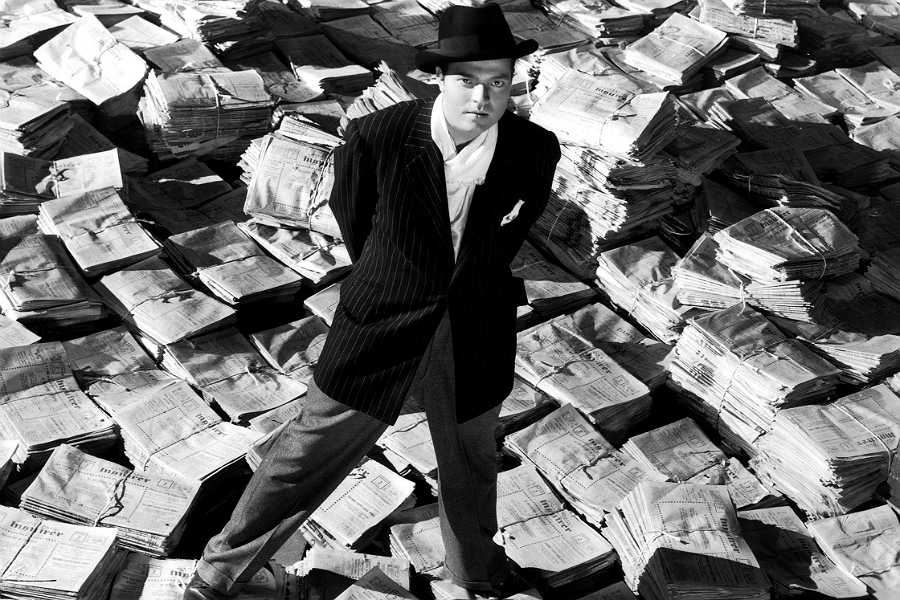Citizen Kane – Previewed

It regularly tops all-time best film lists; what is it about Citizen Kane, asks Adam Scovell…
For a film so much about the power of media and substantiality within public and personal life, Citizen Kane’s (1941) status in the world of cinema seems highly ironic. Its monolithic position as possibly the greatest film ever made (at least until last year’s Sight & Sound poll) placed a clear weight and strain on its chief creator Orson Welles, but is also sadly the reason for so many of the reactionary dismissals of it. In other words, it’s extremely hard to imagine such criticism towards it once this accolade is removed.
Few films could survive under the sheer pressure of such a burden, especially given the amount of time it has had to carry so heavy a crown. Crown implies privilege yet both its director, and the film itself, actively go against its status and appear to have been hurt by the achievements of it more than anything else.
From most interviews with Welles, perhaps the most daring maverick to escape from the clutches of the Hollywood money men, he seems almost reluctant to acknowledge Kane (or any of his past films for matter, often focussing on the dozens of current projects he’d be in the depths of never finishing). It seems as if creating such a stroke of brilliance on the first play with the “world’s biggest electric train set a boy ever had” seems to have marred, jinxed and overshadowed all of his work since; a very cruel tragedy considering how excellent most of his post-Kane work is.
Kane does however appear to have this power to block out the sun. It’s not an unjust ability of course: it goes without saying that the film is a masterpiece. Mixing topical drama (to the point where the centre of the topic – largely thought to be publishing magnate William Randolph Hearst –tried a smear campaign against Welles and the film with the intent of having the prints destroyed) with humour, pathos and a startling visual eye, this crowning glory of Hollywood is actually a product born of a dislike for their system and authority.
Welles would continue to be progressive, politically and within his films, in later years yet Kane’s reception remains unsurprising even with this in mind. Even its snubbing at the Oscars for best film seems unsurprising (it went to John Ford’s excellent How Green Was My Valley (1941)) at least in the context of the time. Years of post-posturing have produced a very obvious and almost natural backlash, though the criticisms of the picture are largely unjustified; seemingly born out of a desire to knock down a hierarchy whose building had nothing to do with Welles but with the post-film analysis writers.
While Welles’ later films all produced startling visual qualities (some of the best in fact), Kane is still one of the most visually stunning works of art produced during the last century. There’s an obvious leaning to what would soon be deemed film-noir, with shadows and light being used to startling and beautiful effect. This is merely the tip of the iceberg when waxing lyrical about Kane’s visuals.
These aren’t merely creative choices; this is visual poetry conceived of a feel for theatre, natural genius and even a quaint naivety that clearly meant there were no limits to Welles’ ambitions; from the initial haunting shots of Xanadu (Kane’s isolated palace) to the illusion-based tracking shot straight through a neon sign into a bar, but even the quieter moments have a sense of achievement.
Kane doesn’t make use of stunning aesthetic techniques for the sake of it; Welles’ eye for revealing the emotional state of characters explicitly through visuals is simply astonishing. A short montage of Kane having breakfast with his wife over time is wondrous, showing the gradual distance building between husband and wife simply through the size and length of the table they sit at. The film is full of such moments; little ideas that, collected together, make up more imaginative ideals than some directors could hope for throughout an entire career.
Then there are the performances. Joseph Cotton is particularly marvellous, but Welles is again at the centre, playing the media mogul at all times of life except childhood. In the end, the narrative hides its true purpose behind the mystery of dying words, occupying itself with showing a whole, extravagant life in order to lead to an apparent central mystery. Really though, Kane is simply about childhood and the longing for the time of innocence before being forced to face the reality of adulthood (even if that adulthood is one blighted by a financially enabled immaturity).
When at last revealed, the mystery isn’t simply solved but shown to be explicitly about childhood or, more specifically, childhood before being set on the path that Charles Foster Kane is forced down. This clawing for nostalgia may perhaps explain why Hearst, the supposed inspiration of the film, was so angry about it. All of the stories about him being enraged at the implied affairs, the power hungry coldness and the ruthlessness seem substantial enough.
It is however far more believable, perhaps even romantic, to imagine the isolated man atop the ivory tower, craving for that time in his now hollow, vacuous life, when the only thing that really mattered in the world was having fun playing in the snow on a cold winter’s day.
Adam Scovell
Citizen Kane screens Thursday 9.30pm @ St. Luke’s Bombed Out Church £2





